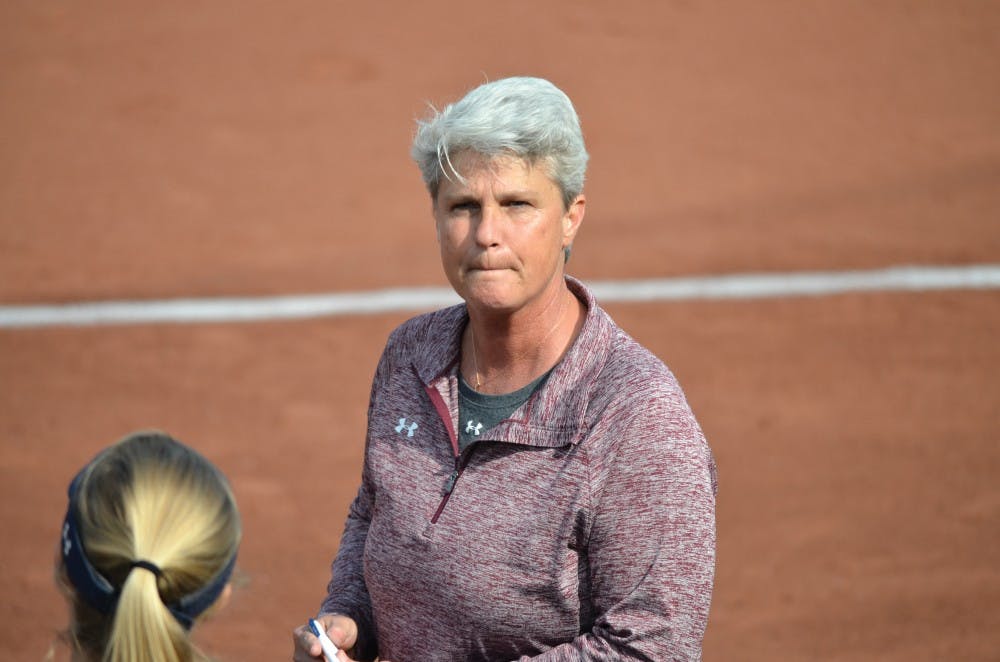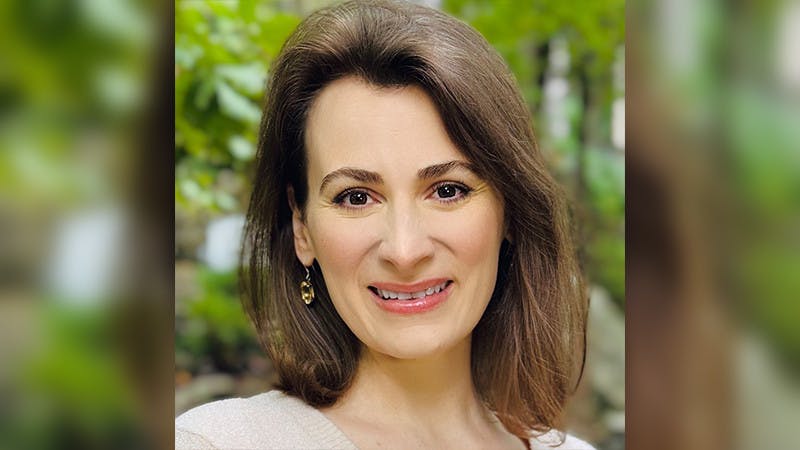
Before coming to Penn in 2004, softball coach Leslie King captained the New Zealand National Softball Team to a silver medal finish at the 1999 Women's World Championships.
Credit: Ananya Chandra , Ananya ChandraThe first time that Penn softball coach Leslie King stepped onto a softball diamond, she broke her nose.
A freshman in high school at the time, King fell victim to an untimely ground ball that flew up into her face rather then nestling into her mitt.
“I had never played before,” she explained. “But I still came back the next day.”
The injury was a rather inauspicious start — one that does not reflect the lengthy and illustrious softball career King would go on to have both stateside and across the Pacific Ocean in New Zealand.
Just four years after trying out for her high school team, King earned a scholarship to play for National Softball Hall of Fame coach Judi Garman at Cal State-Fullerton and led the Titans to three appearances at the Women’s College World Series, including a second-place finish in 1983 and third-place finishes in 1982 and 1985.
King earned the starting nod behind the plate during her first year playing for the Titans. After the 1982 season, Garman wrote of King, “It’s hard to believe she’s just a freshman.” By her graduation in 1985, Garman would sing even higher praises for King, who earned three all-conference honors and an invitation to play for the U.S. National Team on a barnstorming tour through China in 1985.
After graduation, King traveled to New Zealand on an offer to play soccer — a sport she had not seriously considered since high school.
“The country is beautiful, the people are beautiful [and] I just fell in love with it,” she said. “It was soccer [that] got me my citizenship because they wanted me to play in an international tournament for them in 1986.”
King went on to captain the New Zealand National Soccer team at the first FIFA Women’s World Cup in 1991, where the Kiwis did not advance beyond the group stage.
“It was an amazing, amazing experience to be at a World Cup FIFA event,” she said. “I was a goalkeeper in soccer and a shortstop and catcher in softball. I think you can kind of see the transfer of skills — the skill set with hand-eye, agility and reaction time was all pretty similar.”
Indeed, those skills transferred naturally for King, who was selected for the National Softball Team in 1987 and later named captain for the squad that qualified for the 2000 Sydney Olympics.
“To have an expatriate, so to speak, captaining another country’s team was a really unique situation to be in,” King explains. “It had its challenges but it was also a great honor to be chosen as an American to captain a New Zealand team.”

The pinnacle of King’s softball career came in 1999, when the Kiwis won the silver medal at the Softball World Championships hosted in Normal, Ill. The memory shines not because of the action on the field, but for the game that never was.
After tallying a 9-1 record in pool play, New Zealand was set to play the United States in the world championship final. Mother Nature had other plans.
Just two innings into the game, the skies opened up in a torrential downpour and forced a rain delay.
“It just poured and poured and poured and poured. We all just stood in the dugout waiting for it to stop and it never did,” King said. “So they cancelled it. The world championship final!”
The New Zealand squad had already booked tickets for an international flight back home the day after the World Championship final, so there was no opportunity to reschedule the game. In what remains as one of the most controversial rulings in women’s softball history, the gold medal was awarded to the United States over New Zealand due to the Americans’ perfect 10-0 record in pool play.
“It was kind of like reading a really good book and the last page was missing,” King recalled of the rained-out game.
For her efforts in Normal, King was named 2000 New Zealand Player of the Year. Despite the anticlimactic outcome, King relished every opportunity she got to play against the U.S. National Team.
“I always knew the players on the U.S. team,” she said. “I was always super determined when I did play against the United States that I wanted to have a really good game.”
King retired the following year at the age of 35. Still itching to be a part of the sport, King faced a major dilemma.
“They don’t have the collegiate system [in New Zealand] where you have college sports. So if I wanted to stay in the game that I loved, I was going to have to come back to the states to coach.”
King got her first coaching job as an assistant coach at Lock Haven University in 2000 before moving to George Washington University in 2003. In 2004, she was named head coach of Penn softball and has since won five Ivy League South Division titles and one Ivy League title.
Today, King is frequently cited as one of the most influential softball players of her generation in New Zealand. While she recognizes her role in the development of softball across the globe, she is quick to praise her predecessors.
“I’d like to think there [are] a lot of people way before my time that did the grunt work to establish the game,” she said. “If you look at ESPN ratings, it is one of the strongest growing sports as far as the viewership.”
While at Penn, King got to reap the benefits from softball’s growing global popularity. After winning the Ivy title in 2013 and advancing to NCAA Regionals, the Quakers got a taste of the limelight.
“We played on primetime on a Friday night at 6 PM on ESPN. Not even ESPN2 or ESPN3, it was the primetime Friday night,” she said. “They chose to put that on over an NBA basketball playoff game, which I thought was pretty cool.”
Despite all of the international experience King has accumulated over the years, the sport has come to mean different things to her at different points in her life.
“I think for me, softball has always been such an essential part of my life and it was really when I had children that there were things that were more important. It took until then, but I try not to take it too seriously.”
Similarly, all that playing and coaching experience has given King one token piece of advice to give to all of her players.
“It’s just a game and the sun will still rise tomorrow.”
Just as it did so many years ago, the morning after King first broke her nose.
The Daily Pennsylvanian is an independent, student-run newspaper. Please consider making a donation to support the coverage that shapes the University. Your generosity ensures a future of strong journalism at Penn.
DonatePlease note All comments are eligible for publication in The Daily Pennsylvanian.






